Ciné Droit Libre komt eraan. Semfilms Burkina Faso organiseert het mensenrechtenfilmfestival alweer voor de derde maal in Ouagadougou. Voilà de televisiespot van de hand van Gideon Vink.
http://www.dailymotion.com/swf/iyo7e8yLBWUuigVcV
poetry
Zondagochtend. Stommelend door boeken, vond ik zojuist een passage van Lewis die je bij aanvang van iedere schrijfdag driemaal hardop zou moeten voordragen aan jezelf.
Poetry most often communicates emotions, not directly, but by creating imaginatively the grounds for those emotions. It therefore communicates something more than emotion; only by means of that something more does it communicate the emotion at all... This, which is eminently true of poetry, is true of all imaginative writing. One of the first things we have to say to a beginner who has brought us his MS. is, "Avoid all the epithets which are merely emotional. It is no use telling us that something was 'mysterious' or 'loathsome' or 'awe-inspiring' or 'voluptuous'. Do you think your readers will believe you just because you say so? You must go quite a different way to work. By direct description, by metaphor and simile, by secretly evoking powerful associations, by offering the right stimuli to our nerves (in the right degree and the right order), and by the very beat and vowel-melody and length and brevity of your sentences, you must bring it about that we, we readers, not you, exclaim 'how mysterious!' or 'loathsome' or whatever it is. Let me taste for myself, and you'll have no need to tell me how I should react to the flavour."from C.S. Lewis, Studies in words [1960]
Borry Bana opnieuw in de prijzen
anderman @ tribeca
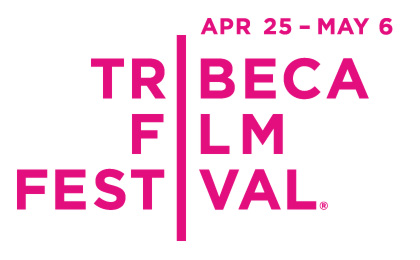
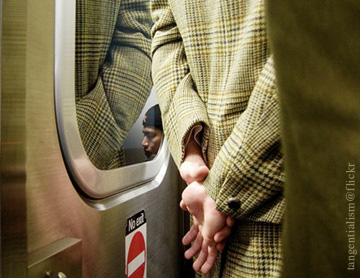
Anderman is geselecteerd voor de competitie van het Tribeca Filmfestival in New York
Screening Schedule Thursday, April 26, 11:15 pm, A34-14 Saturday, April 28, 5:30 pm, AKB-12 Tuesday, May 1, 10:00 pm, RG-11 Friday, May 4, 8:00 pm, AKB-13 Sunday, May 6, 2:00 pm, AV7-01
anderman vandaag in nrc
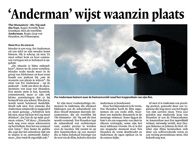 Moeder is een veeg. Per Anderman zit aan tafel en zijn moeder komt binnen. Hij is scherp, zij niet. Ze staat achter hem en haar contouren vervagen tot ze helemaal is opgelost. „De situatie is bijna onhoudbaar”, horen we de zoon vertellen. Lees verder
Anderman wijst waanzin plaats [pdf]
Moeder is een veeg. Per Anderman zit aan tafel en zijn moeder komt binnen. Hij is scherp, zij niet. Ze staat achter hem en haar contouren vervagen tot ze helemaal is opgelost. „De situatie is bijna onhoudbaar”, horen we de zoon vertellen. Lees verder
Anderman wijst waanzin plaats [pdf]
quote unquote
De eerste week van de Shadowdocmasterclass achter de rug. Een mooie ervaring. Broeden, hakken, malen en snijden. Een week van plannen maken onder leiding van de Duitse rot in het producentenvak Werner Dütsch. Een greep uit zijn uitspraken.
Now that we have said goodbye to Werner, it seems safe to share a couple of his fine statements. Enjoy!
“There are too many documentaries. And they are all so serious and so very important. I have become sceptical about this so called importance. There is more propaganda in documentaries than in feature films. But I think the audience of today sees so much, that they know what’s going on. Maybe the time has come when cinema can’t manipulate any longer”.
“We don’t have to show people [in a documentary] to tell something about them. Because of television we have come to think that there is no other way to identify with people then by hearing them talk. But recording an interview is the way of the lazy filmmaker: it leaves all the work to the audience.”
“You can also show faces in a non-expressive way. Because of fiction films we think that faces must be full of meaning. This is especially true for the old German actors. They always have these specific targets in their faces. Even when you take a brief look at them, you can write down immediately what they are thinking. It can be torturing.”
“In Vertov’s movie [man with a movie camera] the individual shots are void of meaning. Only in the combination with other shots they are significant. With every cut the film is shouting: “I AM A MOVIE”.
“Sync sound is just one of the options. But so often image and sound are treated like master and slave. Like the bourgoisie and the proletariat.”
“Oh no, symbolic photography. It’s childish. It’s abusive.”
“If you are in a place that you don’t like. Force yourself to frame your pictures without prejudice.”
“It is funny that some people try to make cinema with security cameras, because the very idea behind these camera’s is the opposite of cinema: they are recording so that nothing will happen.”
“It is part of our tragedy that we are more moved by a construction [i.e. fiction] then by reality. It must have to do with the fact that emotions in cinema are not so expensive. You are moved to tears by a divorce, but it’s not as expensive.”
“Everybody in the audience knows this place and what it sounds like. Why should we hear the sound, if we know it already? Don’t double things.”
“If you interview people, don’t ask about their ideas. That gives them a chance to hide behind an idea of themselves. Ask about practical things (what are you doing? how long? what do you like about it? who taught you this? etc.)."
“Experimental. I hate that word experimental. After an experiment is succesful, they never call it experimental. They call it succesful.”
Deze tekst is ook te vinden op het VPRO blog van de masterclass SHADOWDOCBLOG
Le sang des bêtes
[coolplayer width="400" height="326" autoplay="0" loop="0" charset="utf-8" download="1" mediatype=""]le sang des betes [/coolplayer]
Stefan Majakowski roemde al weken deze film van Georges Franju uit 1949. Zo'n enthousiaste vooraankondiging zorgt soms voor een tegenvallende voorstelling. Maar niet deze keer.
anderman - stills
Le Griot de Daporé - sur le plateau
een ingewikkeld verhaal, eenvoudig verteld [2005]
enkele portretten
Cannes Kiekjes
Een ingewikkeld verhaal naar Cannes

notities uit het stof [2005]
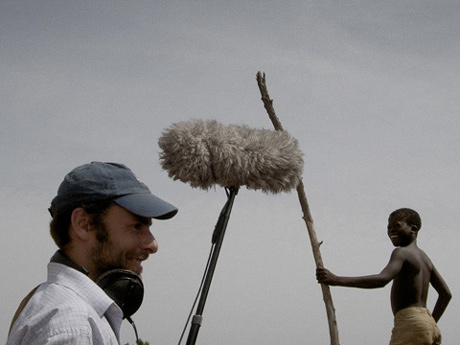 blog van zomer 2005 met ondermeer: omzwervingen in ouagadougou, malaria, opnames van 'le griot de daporé', diner bij de nonnen
blog van zomer 2005 met ondermeer: omzwervingen in ouagadougou, malaria, opnames van 'le griot de daporé', diner bij de nonnen
lomography
notes from the road [2003]
usa log 2003.
omzwervingen door de verenigde staten.


















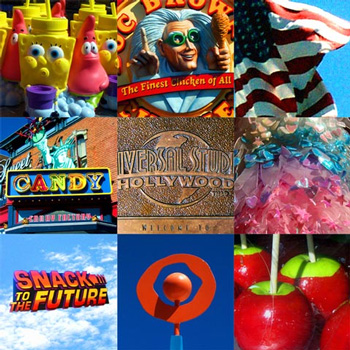








![zee [aberdeen, schotland, voorjaar 2003] zee [aberdeen, schotland, voorjaar 2003]](http://www.jaapvanheusden.nl/pic/leegte_stilte/zee_front.jpg)









